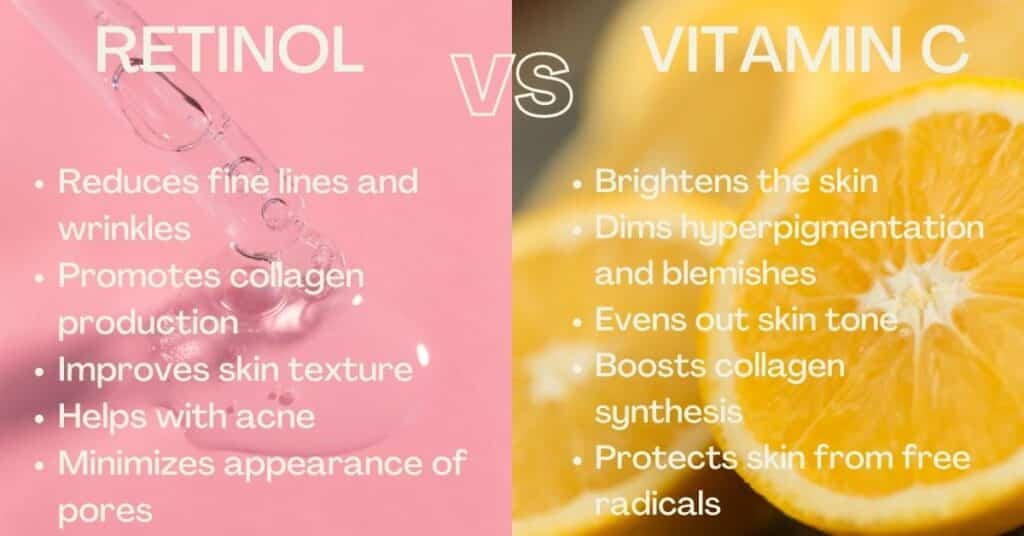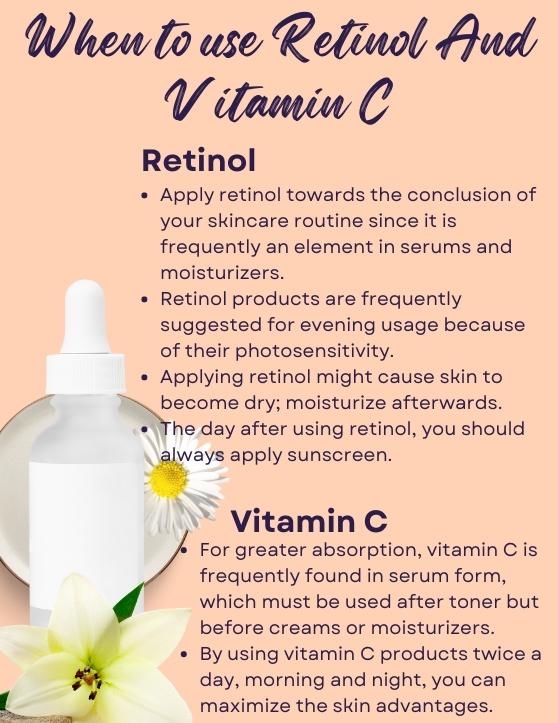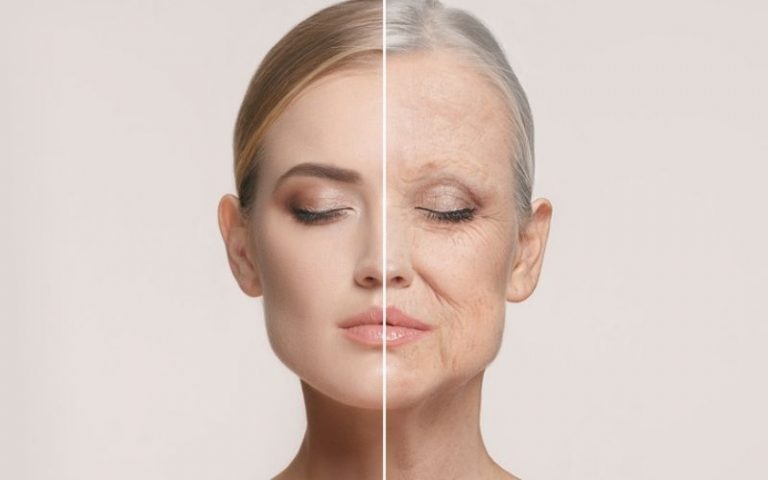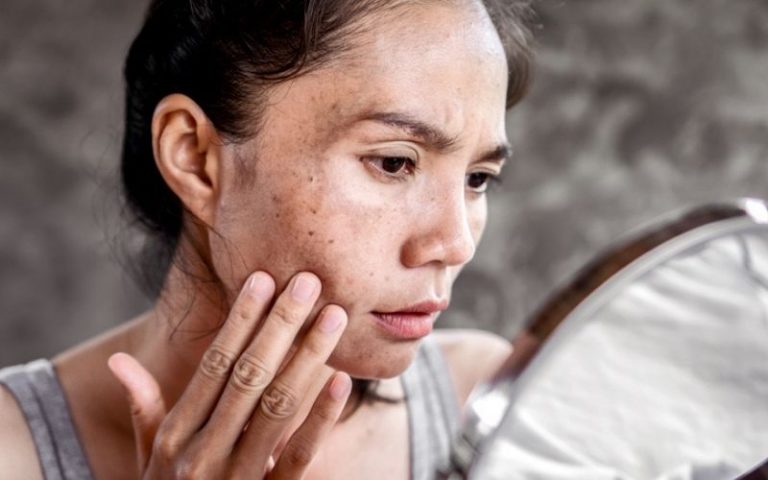Retinol vs. Vitamin C: Which Is Better For Anti-Aging?

When it comes to skincare, the quest for youthful and radiant skin is a common goal. Among the many ingredients touted for their anti-aging benefits, retinol and vitamin C stand out as popular choices. Both have proven track records in the skincare world, but how do they compare?
In this article, we will delve into the realm of retinol and vitamin C, exploring their individual benefits, potential side effects, and the best practices for incorporating them into your skincare routine.
So, let’s unravel the mystery and find out which ingredient reigns supreme in the battle of retinol versus vitamin C.
Table Of Contents
- Understanding Retinol vs. Vitamin C
- Comparing Benefits: How Retinol Works for Skin vs. Vitamin C
- Targeting Skin Concerns
- Choosing the Right Ingredient: Factors to Consider for Your Skincare Routine
- Synergistic Effects: Combining Retinol and Vitamin C in Your Anti-Aging Regimen
- Potential Side Effects: What to Know about Retinol and Vitamin C
- Mixing Up – Vitamin C with Retinol – Is it a Good Combination to go for?
- Application Methods: Best Practices for Incorporating Retinol and Vitamin C into Your Skincare Routine
- Finding the Balance: How to Alternate or Layer Retinol and Vitamin C Products
- Personalizing Your Routine: Assessing Skin Type and Goals for Optimal Results
- Expert Tips: Advice from Dermatologists on Using Retinol and Vitamin C
- Conclusion: Retinol or Vitamin C – the Ultimate Anti-Aging Powerhouse?
Understanding Retinol vs. Vitamin C
Retinol, derived from vitamin A, is a powerhouse ingredient known for its ability to enhance skin cell turnover, stimulate collagen production, and decrease the appearance of fine lines and wrinkles. It works by penetrating the skin’s surface, promoting cellular renewal, and boosting collagen synthesis. This ultimately leads to smoother, firmer, and more youthful-looking skin.

On the other hand, vitamin C, also known as ascorbic acid, is a powerful antioxidant that helps protect the skin from free radicals, which are unstable molecules that contribute to premature aging. Vitamin C plays a crucial role in collagen synthesis, brightening the complexion and reducing the appearance of dark spots and hyperpigmentation. Additionally, it aids in neutralizing environmental stressors, such as pollution and UV damage.
Comparing Benefits: How Retinol Works for Skin vs. Vitamin C
Retinol and vitamin C both offer significant benefits for anti-aging, but they work in different ways. Retinol primarily focuses on collagen production and cell turnover, making it highly effective in reducing wrinkles and improving skin texture. Its ability to increase cell turnover helps fade acne scars and promote a more even skin tone.
Vitamin C, on the other hand, is renowned for its brightening properties. By preventing the generation of melanin, the pigment responsible for dark spots, vitamin C can effectively fade hyperpigmentation and even out skin tone. It also provides a layer of defense against environmental damage, which is crucial for maintaining youthful skin.
Here’s a tabular comparison of the benefits of retinol and vitamin C for anti-aging:
Benefits | Retinol | Vitamin C |
Wrinkle Reduction | Stimulates collagen production, fading the appearance of wrinkles and fine lines | Helps improve skin elasticity and firmness, reducing the visibility of wrinkles and lines |
Brightening | Can improve skin tone and texture, reducing the appearance of acne scars | Helps fade dark spots and hyperpigmentation, resulting in a more even and radiant complexion |
Collagen Boost | Enhances collagen synthesis, promoting firmer and more youthful-looking skin | Stimulates collagen production, improving skin elasticity and reducing sagging |
Antioxidant | Provides mild antioxidant benefits, protecting the skin from free radicals and oxidative stress | Acts as a powerful antioxidant, shielding the skin from environmental stressors and preventing premature aging |
Skin Cell Renewal | Accelerates skin cell turnover, promoting smoother and more radiant skin | Enhances skin cell renewal, leading to a fresher and more youthful complexion |
Hyperpigmentation Reduction | Helps fade age spots and sunspots, resulting in a more even skin tone | Reduces the visibility of dark spots, hyperpigmentation, and discoloration |
Note: This table provides a general overview of the benefits of retinol and vitamin C. Individual results may vary, and it’s important to consider factors such as skin type, sensitivity, and product formulation when incorporating these ingredients into your skincare routine.
Targeting Skin Concerns
If you’re primarily concerned with wrinkles, fine lines, and overall texture, retinol is your go-to ingredient. It is incredibly effective in minimizing the appearance of wrinkles and promoting smoother skin. However, retinol can be drying and potentially irritating for sensitive skin, so it’s important to start with a low concentration and gradually increase usage.
On the other hand, if your main concern is brightening your complexion, fading dark spots, or preventing future pigmentation issues, vitamin C is the hero you need. Vitamin C serums and creams can help you achieve a radiant and even skin tone. Moreover, vitamin C is generally well-tolerated by most skin types, making it a versatile option for many individuals.
Choosing the Right Ingredient: Factors to Consider for Your Skincare Routine
When deciding between retinol and vitamin C, it’s essential to consider various factors, including your skin type, sensitivity, and specific concerns. Here are a few points to keep in mind:
1. Skin Sensitivity
Retinol can cause dryness, redness, and flakiness, especially when starting with higher concentrations. If you have sensitive or reactive skin, it’s crucial to introduce retinol slowly and consider lower concentrations or alternative ingredients, such as retinyl palmitate.
2. Sun Sensitivity
Using retinol can increase your skin’s vulnerability to sun damage. It is crucial to incorporate a broad-spectrum sunscreen into your routine and apply it diligently, even on cloudy days.
3. Stability
Vitamin C is notoriously unstable and can degrade when exposed to light and air. Look for products with stable forms of vitamin C, such as L-ascorbic acid or ascorbyl glucoside, and ensure proper storage to maintain its efficacy.
4. Combination Therapy
Retinol and vitamin C can complement each other when used together. Consider incorporating both ingredients into your skincare routine but be mindful of potential interactions and sensitivities. Start by using them on alternating nights or in different steps of your routine to minimize any potential irritation.
Synergistic Effects: Combining Retinol and Vitamin C in Your Anti-Aging Regimen
While retinol and vitamin C can deliver impressive results individually, their powers combine when used together. These ingredients work synergistically to enhance the overall anti-aging benefits and provide comprehensive protection for your skin. The combination of retinol’s collagen-boosting effects and vitamin C’s brightening properties can deliver remarkable improvements in skin texture, tone, and elasticity.
To effectively combine retinol and vitamin C, it’s crucial to be mindful of product compatibility, concentrations, and your skin’s tolerance. Start by incorporating each ingredient into your routine separately, allowing your skin to adjust before introducing the other. Consider using retinol at night and vitamin C in the morning to maximize the benefits without overloading your skin.
Potential Side Effects: What to Know about Retinol and Vitamin C
As with any active skincare ingredient, retinol and vitamin C can cause side effects, especially if not used correctly or in the right concentration. It’s important to be aware of these potential side effects and take necessary precautions for a safe and effective skincare routine.
Retinol, in particular, can cause skin irritation, especially during the initial stages of use. Common side effects include redness, flakiness, and sensitivity to sunlight. To minimize these side effects, commence with a low concentration and gradually increase as your skin adjusts. It’s also essential to use retinol products at night and follow up with broad-spectrum sunscreen during the day to protect your skin from potential sun damage.
On the other hand, vitamin C is generally well-tolerated by most individuals. However, some people may experience mild irritation, such as redness or stinging, especially if using higher concentrations. If you have sensitive skin, it’s advisable to start with a lower concentration and monitor your skin’s reaction. Additionally, it’s important to note that vitamin C can degrade when exposed to light and air, so opt for products packaged in opaque or airless containers.
If you’re pregnant or breastfeeding, it’s always best to seek guidance from your healthcare provider before incorporating retinol or vitamin C into your skincare routine. While these ingredients are generally considered safe, it’s important to take extra precautions during pregnancy and breastfeeding.
By being mindful of these possible side effects and taking necessary precautions, you can safely incorporate retinol or vitamin C into your skincare routine and achieve the desired anti-aging results.
Mixing Up – Vitamin C with Retinol – Is it a Good Combination to go for?
Absolutely! As mentioned earlier, combining retinol and vitamin C can provide remarkable anti-aging benefits. However, it’s crucial to introduce them gradually and pay attention to your skin’s response. Start by using each ingredient separately to ensure compatibility, and once your skin is comfortable, you can experiment with combining them.
Application Methods: Best Practices for Incorporating Retinol and Vitamin C into Your Skincare Routine

To get the most out of retinol and vitamin C, follow these best practices:
- Cleanse: To eliminate dirt, oil, and makeup, start your skincare routine by gently cleansing your face with a mild cleanser.
- Tone: Use a hydrating and pH-balanced toner to prepare your skin for better absorption.
- Retinol Application: If using retinol, apply a pea-sized amount to your face and neck, avoiding the eye area. Start with a low concentration and gradually increase usage as tolerated.
- Vitamin C Application: When using vitamin C, apply a few drops of serum or a small quantity of cream onto your face and neck. Massage it gently and let it fully absorb into your skin.
- Moisturize: Apply a moisturizer to seal in hydration and nourish your skin.
- Sunscreen: Finish your morning routine by applying broad-spectrum sunscreen with an SPF of 30 or higher to shield your skin against UV damage.
Finding the Balance: How to Alternate or Layer Retinol and Vitamin C Products
If you prefer to alternate between retinol and vitamin C, use retinol at night and vitamin C in the morning. This allows each ingredient to work optimally without causing any potential interactions or sensitivities.
However, if you choose to layer them, apply retinol first, wait a few minutes for it to absorb, and then apply your vitamin C product.
Personalizing Your Routine: Assessing Skin Type and Goals for Optimal Results
To personalize your skincare routine, consider your skin type and specific goals. Here are some guidelines based on different skin types:
- Dry Skin: Opt for gentle formulations of retinol and vitamin C and ensure you’re using a moisturizer to prevent dryness.
- Oily Skin: Look for lightweight, oil-free formulations of retinol and vitamin C to avoid adding excess oil to your skin.
- Sensitive Skin: Start with lower concentrations and consider alternative forms of retinol, such as retinyl palmitate. Choose vitamin C products with minimal ingredients to minimize potential irritation.
- Combination Skin: Adjust the application of retinol and vitamin C based on the needs of different areas of your face. For example, you may need more retinol on your cheeks and more vitamin C in your T-zone.
If unsure about your skin type, use our beginner’s guide to identify.
Expert Tips: Advice from Dermatologists on Using Retinol and Vitamin C
To help you navigate the world of retinol and vitamin C, here are some valuable tips from dermatologists:
1. Start Slowly
Dermatologists recommend starting with a low concentration of retinol and gradually building up usage. This allows your skin to acclimate to the ingredient and minimizes the risk of irritation. The same principle applies to vitamin C – begin with lower concentrations and gradually increase as your skin adjusts.
2. Consistency is Key
Skin specialists emphasize the importance of consistency when using retinol and vitamin C. Regular, and long-term use can yield the best results. Incorporate these ingredients into your skincare routine consistently to maximize their anti-aging benefits.
3. Protect with Sunscreen
It is crucial to prioritize daily sunscreen use when incorporating retinol into your skincare routine. Retinol can increase your skin’s sensitivity to the sun, so it’s essential to apply a broad-spectrum sunscreen with an SPF of 30 or higher every day. This helps protect your skin from potential sun damage and maintains the results of your retinol and vitamin C routine.
4. Layering Order
If using both retinol and vitamin C in your routine, apply vitamin C in the morning and retinol at night. This will ensure maximum absorption and effectiveness of both ingredients.
5. Moisturize
Both retinol and vitamin C can potentially cause dryness or sensitivity. To counteract this, make sure to moisturize your skin thoroughly and use broad-spectrum sunscreen during the day to protect against sun damage.
6. Consider Professional Guidance
If you’re unsure about incorporating retinol or vitamin C into your routine, it’s always beneficial to consult a dermatologist. They can assess your skin type, address any concerns or conditions you may have, and provide personalized advice and recommendations tailored to your needs.
7. Be Patient
It is advised to practice patience when incorporating retinol and vitamin C into your skincare routine. These ingredients work at a cellular level, so visible results may take time. Consistent use over several weeks to months is necessary to see significant improvements in your skin’s texture, tone, and overall appearance. Remember, good things come to those who wait!
8. Adjust According to Your Skin
It is essential to customize your skincare routine based on how your skin responds, as emphasized by skincare experts. Everyone’s skin is unique, so it’s essential to observe how your skin reacts to retinol and vitamin C. If you experience excessive dryness, redness, or irritation, you may need to adjust the concentration, frequency, or formulation of the products you’re using.
By adopting these expert tips, you can effectively incorporate retinol and vitamin C into your skincare routine and maximize their anti-aging benefits. Remember to start slowly, be consistent, protect your skin with sunscreen, and seek professional guidance if needed. With time and patience, you can achieve healthier, more youthful-looking skin.
Conclusion: Retinol or Vitamin C – the Ultimate Anti-Aging Powerhouse?
In the battle of retinol versus vitamin C, there is no clear winner. Both ingredients offer remarkable anti-aging benefits and can work synergistically to improve your skin’s texture, tone, and overall youthfulness. Whether you choose retinol for wrinkles and fine lines or vitamin C for brightening, incorporating these elements into your skincare routine can help you achieve a more radiant and youthful complexion.
Remember to consider your skin type, sensitivity, and specific concerns when choosing between retinol and vitamin C. Start with lower concentrations, introduce them gradually, and always prioritize sun protection. If you’re unsure about incorporating these ingredients into your routine, consult with a dermatologist who can provide personalized guidance.
So, go ahead and embark on your anti-aging journey with Retinol and vitamin C as your allies, and embrace the potential they hold for healthier and more youthful-looking skin.
FAQs
Q: What does Retinol do?
A: Retinol enhances skin cell turnover, stimulates collagen production, and reduces the appearance of fine lines and wrinkles, promoting smoother and firmer skin.
Q: Does vitamin C help acne?
A: Vitamin C can help improve acne-prone skin by reducing inflammation, fading acne scars, and promoting a more even skin tone.
Q: Can I use vitamin C and Retinol together?
A: Yes, you can use vitamin C and Retinol together. Start by introducing each ingredient separately and gradually combine them to ensure compatibility and minimize any potential irritation.
Q: Can Retinol and vitamin C be used during the day?
A: Retinol is generally recommended for nighttime use due to its potential to increase sun sensitivity. However, vitamin C can be safely used during the day and provides antioxidant protection against environmental damage.
Q: Can I use Retinol and vitamin C if I have sensitive skin?
A: Yes, individuals with sensitive skin can use Retinol and vitamin C, but it’s important to start with low concentrations and gradually build up usage. Consider alternative forms of Retinol, such as retinyl palmitate, and choose vitamin C products with minimal ingredients.
Q: How long does it take to see results from Retinol and vitamin C?
A: Results from Retinol and vitamin C can vary depending on individual factors and the specific concerns being addressed. However, noticeable improvements in skin texture and tone can typically be observed within a few weeks to a few months of consistent use.
Q: Can you use hyaluronic acid with Retinol?
Yes, you can use hyaluronic acid with retinol. In fact, combining these two ingredients can be highly beneficial for your skin. Applying hyaluronic acid before or after retinol can help counteract any potential dryness or irritation that retinol may cause. Remember to follow with a moisturizer to lock in the hydration.
References
https://www.kiehls.com.ph/blog/retinol-vs-vitamin-c-which-one-should-you-choose/
https://www.neostrata.com/learn-about-skin-care/can-you-use-retinol-and-vitamin-c-together.html#
https://www.womanandhome.com/beauty/skincare/retinol-vs-vitamin-c/
https://nayaglow.com/blogs/news/retinol-vs-vitamin-c-do-i-need-to-use-both-in-my-skincare-routine
https://www.muradskincare.ca/skin-care-library/vitamin-c-vs-retinol-which-one-for-wrinkles/
https://www.realself.com/news/retinol-vs-vitamin-c-for-skincare





